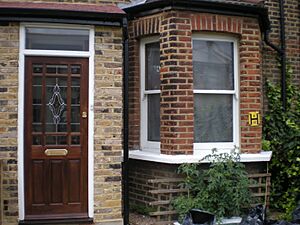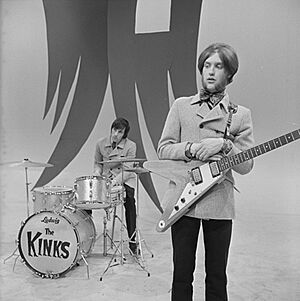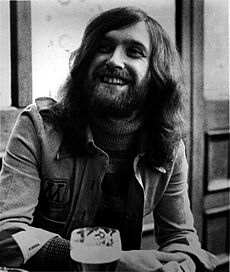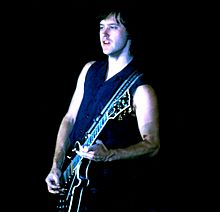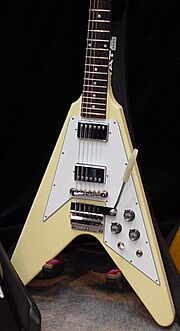Dave Davies facts for kids
Quick facts for kids
Dave Davies
|
|
|---|---|

Davies in 2002
|
|
| Background information | |
| Birth name | David Russell Gordon Davies |
| Born | 3 February 1947 Fortis Green, London, England |
| Origin | Muswell Hill, London, England |
| Genres |
|
| Occupation(s) |
|
| Instruments |
|
| Years active | 1963–present |
| Labels |
|
| Associated acts | The Kinks |
David Russell Gordon Davies (born 3 February 1947) is an English guitarist, singer, and songwriter. He is best known as the lead guitarist and backing singer for the famous English rock band the Kinks. His older brother, Ray, was the main songwriter and singer for the band. Dave and Ray were the only members who stayed with the Kinks throughout their entire history.
Dave Davies also wrote and sang lead vocals on some Kinks songs, like "Death of a Clown" and "Strangers". He has also had a successful solo career, releasing many albums and singles.
Davies is famous for his creative electric guitar playing. He was one of the first musicians to use electric guitar distortion in popular music. This special sound, with its powerful guitar riffs, greatly influenced future music styles like heavy metal and punk rock. In 1990, he was inducted into the Rock and Roll Hall of Fame as a member of the Kinks. In 2003, Rolling Stone magazine ranked him among the "100 Greatest Guitarists of All Time".
Contents
Early Life and Musical Beginnings
David Russell Gordon Davies was born in North London, England. He was the youngest of eight children, with six older sisters and an older brother, Ray. Growing up, the Davies brothers were surrounded by all kinds of music. Their parents enjoyed old-fashioned music hall songs, while their older sisters listened to jazz and early rock and roll. This mix of music helped shape the Kinks' unique sound later on.
Dave started playing a type of folk music called skiffle. Soon, he got an electric guitar and began trying out new rock sounds. Dave, Ray, and their friend Pete Quaife would practice together in their home. Their house was often filled with music, especially during parties where their parents would sing and play piano. This musical environment helped Dave and Ray develop their skills. They even created the famous two-chord guitar riff for their 1964 hit song "You Really Got Me" on the piano in their front room.
The Kinks: A Musical Journey
Dave Davies formed the Kinks with Pete Quaife in 1963. His brother Ray joined shortly after, becoming the band's main leader. The group was complete when drummer Mick Avory joined. Dave Davies and Mick Avory sometimes had disagreements, which eventually led to Mick leaving the band in the mid-1980s.
Ray and Dave Davies were the only two members who stayed with the Kinks throughout their career. Other bassists and keyboard players joined and left over the years. Dave often worked behind the scenes, but he made important contributions to Kinks records. He sang lead vocals and wrote songs like "Party Line," "Death of a Clown", and "Strangers".
Early Success and Guitar Innovation (1963–1966)
The Kinks signed with Pye Records in late 1963. Dave Davies was just 17 when their first single was released in early 1964. Dave was responsible for the unique, distorted guitar sound on the Kinks' first big hit, "You Really Got Me". He created this sound by cutting the speaker cone of his small amplifier with a razor blade. This was one of the first times distortion was heard in mainstream music, and it had a huge impact on future musicians, especially in heavy metal and punk rock.
"You Really Got Me" was the band's third single. Their first two songs hadn't become hits, and they needed a success to continue their contract. Pye Records didn't like the song at first and wouldn't pay for studio time. The band found other ways to record it, and it became a massive hit, reaching number one in the UK and number seven in the US.
Over the next two years, the Kinks released three albums and several shorter recordings called EPs. They also performed and toured constantly, which sometimes caused tension within the band. There were even some famous fights on stage. One well-known incident happened in May 1965, involving Mick Avory and Dave Davies. During a song, Dave kicked over Mick's drum set. Mick responded by hitting Dave with a drum stand, causing Dave to be knocked out. Dave needed stitches for his head.
In the late 1960s, the Kinks' music changed as Ray's songwriting developed. The band moved away from their early blues-rock sound. They started playing more reflective and nostalgic music, as heard in songs like "Autumn Almanac" and "Waterloo Sunset", and on albums like Something Else by the Kinks.
Solo Work and Later Kinks Albums
In July 1967, Dave Davies released his first solo single, "Death of a Clown". Although he co-wrote it with his brother, it was released under Dave's name. The Kinks' record label, Pye Records, thought Dave's solo work could be popular. Even though it was a "solo" single, the Kinks were the backing band, and the song also appeared on their album Something Else by the Kinks.
"Death of a Clown" was a big hit, reaching number three in the UK. Pye Records planned a solo album for Dave, but his next singles didn't do as well. Because of this, and Dave's own lack of interest at the time, the solo album was never officially released. However, many of these songs were later put together on compilation albums like Hidden Treasures in 2011.
The Kinks released two highly praised albums, The Kinks Are the Village Green Preservation Society (1968) and Arthur (1969). While critics loved them, these albums didn't sell very well at the time.
Comeback and New Directions
After Arthur, the Kinks had a big comeback with their hit song "Lola" in 1970. Dave contributed two of his own songs to the album that came with "Lola": the acoustic "Strangers" and the rock song "Rats".
In the early 1970s, the Kinks released albums like Muswell Hillbillies, which had a country-rock feel. Later, they experimented with theatrical albums that included large groups of singers and musicians. These albums were not as successful with critics or the public.
In 1977, the Kinks changed record labels and went back to being a five-piece rock band. Their album Sleepwalker was a success, both with critics and commercially. Dave was happy to return to more guitar-focused songs, and he considers Sleepwalker one of his favorite albums.
The 1980s and Beyond
The Kinks reached their biggest commercial success in the early 1980s. They started using music videos, which were becoming very popular on MTV. Their song "Come Dancing" became a huge hit in both the UK and the US.
By 1985, the Kinks' popularity began to fade. Mick Avory left the band after their album Word of Mouth, partly due to his ongoing disagreements with Dave Davies. Bob Henrit took Mick's place as drummer.
The Kinks continued to release albums, but they didn't sell as well as before. Dave Davies contributed songs to these later albums, such as "Rock 'n' Roll Cities" and "When You were a Child" on Think Visual (1986).
In 1990, all four original members of the Kinks were inducted into the Rock and Roll Hall of Fame. However, this didn't bring back their earlier success. The Kinks released their final studio album together, Phobia, in 1993. It didn't sell well, and the band stopped recording and touring in 1996.
Dave and Ray Davies reunited on stage to perform "You Really Got Me" in London on 18 December 2015. This was the first time in nearly 20 years that the brothers had performed together.
Dave Davies' Solo Career (1980s–Present)
Dave Davies restarted his solo career in 1980 with the album Dave Davies (AFL1-3603). He played all the instruments himself on this album, which reached number 42 on the Billboard 200 chart. He released more albums, including Glamour (1981) and Chosen People (1983).
After a long break, Dave released Bug in 2002. Fractured Mindz followed in 2007. In 2010, he recorded Two Worlds with his son, Russ Davies, as "The Aschere Project." This album mixed rock, classical, and electronic music.
In 2013, Dave released I Will Be Me and toured the US to promote it. In 2014, he released Rippin' Up Time to celebrate the Kinks' 50th anniversary. He even appeared on The Tonight Show Starring Jimmy Fallon to promote the album. His album Rippin Up New York City was released in 2015.
Signature Instruments
Dave Davies has played many guitars throughout his career. His most recognizable guitar is his Gibson Flying V. He bought it in 1965 and started using it in live shows and on TV. At the time, not many guitarists played Flying Vs. Dave, along with other famous guitarists, helped make this guitar popular. It later became a signature guitar for heavy metal bands.
Dave once shared how he got his Flying V:
I used to play a Guild custom built guitar and the airline lost it on our first American tour in '64 or '65. ... I had to get a replacement quick. I went into a store and they didn't have anything I liked. I saw this dusty old guitar case and I said "What have you got in there?" he said "Oh, that's just some silly old guitar." He got it out and I bought it for about $60.
Dave has also played other guitars, including several Gibson Les Paul models, Fender Telecasters, and a Fender Stratocaster.
Personal Life and Health
Dave Davies married Lisbet in 1967, and they later divorced in 1990. They have four sons: Martin, Simon, Christian, and Russell. He also has three other children, Daniel, Lana, and Eddie.
Davies published an autobiography called Kink in 1996. In the book, he talked about the sometimes difficult professional relationship he had with his brother Ray throughout the Kinks' career.
Dave Davies has been a vegetarian since the late 1960s.
On 30 June 2004, Dave Davies had a stroke. He was promoting his album Bug at the time. He was taken to the hospital and was released on 27 August. By 2006, Dave had recovered enough to walk, talk, and play the guitar again.
In September 2013, Rolling Stone magazine wrote about Davies and his girlfriend Rebecca G. Wilson. She has contributed backing vocals to his songs and has toured as his backup singer since 2014.
A second autobiography, Living on a Thin Line, was released in July 2022. The book's title is also the name of a Kinks song from 1984.
Discography
Studio albums
- AFL1-3603 (1980) US Billboard No. 42
- Glamour (1981) US Billboard No. 152
- Chosen People (1983) US Billboard No. 202
- Bug (2002)
- Fractured Mindz (2007)
- I Will Be Me (2013)
- Rippin' Up Time (2014)
- Open Road (2017) with Russ Davies
Soundtrack album
- Village of the Damned (1995) with John Carpenter
Live albums
- Rock Bottom - Live at The Bottom Line (2000)
- Transformation - Live at The Alex Theatre (2003)
- Rainy Day in June (2004)
- Rippin' Up New York City - Live at the Winery NYC (2015)
Official bootlegs
- Solo Live - Live Solo Performance at Marian College (2000)
- Bugged... Live! (2002)
- Belly Up (2008) - recorded live at the Belly Up Club in San Diego on 29 April 1997, which was at the start of the first major solo tour of the U.S. by Davies
- Around the Galaxy (2009)
Compilation albums
- The Album That Never Was (1987) - singles recorded for his unreleased debut solo album
- Unfinished Business (1999)
- Kinked (2006 release on Koch Records)
- Hidden Treasures (2011) - released and unreleased tracks recorded for his unreleased debut solo album
- Decade (2018) - unreleased tracks from the 1970s
Singles
| Release date | Title | Chart positions | |||||||
|---|---|---|---|---|---|---|---|---|---|
| UK |
AUS |
BEL |
GER |
NLD |
NZ |
SWE | NOR |
||
| 1967 | "Death of a Clown" | 3 | 37 | 5 | 3 | 2 | 10 | — | 7 |
| January 1968 | "Susannah's Still Alive" | 20 | — | — | 27 | 10 | — | 18 | 3 |
| July 1968 | "Lincoln County" | — | — | — | — | 15 | — | — | — |
| January 1969 | "Hold My Hand" | — | — | — | — | — | — | — | — |
| "—" denotes releases that did not chart or were not released in that territory | |||||||||
Other appearances
| Year | Song | Album | Notes |
|---|---|---|---|
| 2003 | "Give Me Love (Give Me Peace on Earth)" | Songs from the Material World: A Tribute to George Harrison | George Harrison cover |
| 2012 | "Money Maker" | Black and Blue: A Tribute to the Black Keys | with Huw Lloyd-Langton |
| "My Generation" | Who Are You: An All Star Tribute to The Who | with Knox and Rat Scabies | |
| 2013 | "After the Ball (1892)" | The Beautiful Old: Turn-of-the-Century Songs | Traditional |
Demo recordings (The Meta Media Demo Series)
- Fortis Green (1999)
- Fragile (2001)
Guest appearances
- In the Mouth of Madness soundtrack, lead guitar on track one (1995)
Projects with Russ Davies
- Purusha and the Spiritual Planet as Crystal Radio (1998)
- Two Worlds as The Aschere Project (2010)
See also
 In Spanish: Dave Davies para niños
In Spanish: Dave Davies para niños
 | Ernest Everett Just |
 | Mary Jackson |
 | Emmett Chappelle |
 | Marie Maynard Daly |


